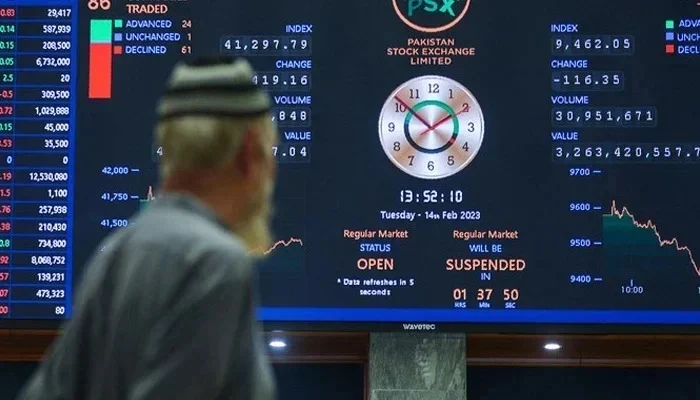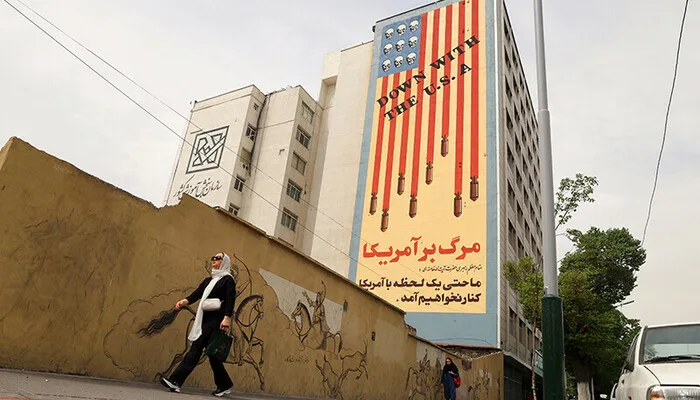
In a turbulent start to the week, the KSE-100 Index at the Pakistan Stock Exchange (PSX) plummeted by nearly 3,900 points on Monday. The dramatic drop was fueled by rising fears over global trade tensions, particularly the reintroduction of Trump-era tariffs, along with growing uncertainty surrounding domestic economic policies.
Sharp Losses Shake Investor Confidence
The benchmark KSE-100 Index closed at 114,909.48, down 3,882.18 points or 3.27% from the previous close of 118,791.66. Earlier in the session, the index had fallen to a shocking intraday low of 110,103.97 — a loss of over 8,600 points or 7.31%. Even the day’s intraday high of 117,601.62 remained in negative territory, trailing 1% behind Friday’s close.
The market’s sharp decline triggered a lower lock when the index dropped more than 5%. Trading was temporarily halted, and all pending orders were cancelled before resuming at 1:03 pm. However, selling pressure continued after the break, deepening the losses before a minor recovery near closing.
Read: Trump’s Tariffs Spark Global Turmoil as China Pushes Back
Global Jitters Meet Local Uncertainty
Market analysts attributed the plunge to a mix of external shocks and internal economic doubts. The reintroduction of Trump tariffs in the U.S. has spurred fears of another wave of global trade disruption, hitting sentiment across Asian markets. Major stock indexes in Japan, South Korea, Taiwan, and China all recorded significant losses. Japan’s Nikkei dropped 6%, while Taiwan’s index crashed nearly 10% — prompting emergency short-selling restrictions.
“These tariffs are reigniting recession concerns and weighing heavily on Asian markets,” said Mustafa Mustansir, Director of Research at Taurus Securities. “The PSX is reflecting that panic, especially in the absence of stabilizing domestic signals.”
Domestic Challenges Compound Pressure
Adding to investor anxiety is the delay in the government’s Rs1.25 trillion bank borrowing plan intended to resolve Pakistan’s massive Rs2.4 trillion circular debt. Uncertainty over the timeline and implementation of this plan has made investors wary of the energy sector’s future stability.
Moreover, skepticism surrounds Prime Minister Shehbaz Sharif’s recent announcement of a Rs7.41 per unit reduction in electricity tariffs. While initially welcomed, analysts later revealed that most of the relief stems from temporary adjustments — not a permanent drop in base tariffs. The actual pre-tax relief stands closer to Rs5.98 per unit, with the rest attributed to tax-related offsets.
“The market viewed the tariff cut with caution,” said Amreen Soorani, Head of Research at Al Meezan Investment. “Investors are beginning to realise that the relief lacks structural reforms and long-term impact.”
Regional and Global Selloffs Add Fuel
The PSX decline mirrored regional trends. Saudi Arabia’s market dropped 6.78% on Sunday, marking its worst performance since the pandemic. Meanwhile, China’s blue-chip stocks fell 4.4% amid speculation about new stimulus measures. MSCI’s Asia-Pacific index (excluding Japan) slid 3.6%.
These losses, combined with Pakistan’s unresolved economic challenges, created the perfect storm at the PSX. The lack of clear direction, both globally and locally, has left investors risk-averse and markets volatile.
As global volatility lingers and domestic reforms remain uncertain, market stability may remain elusive in the short term.
Follow us on Google News, Instagram, YouTube, Facebook,Whats App, and TikTok for latest updates












